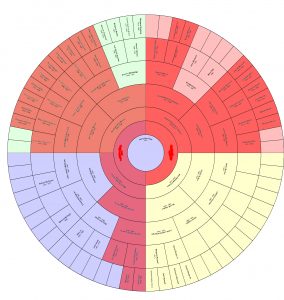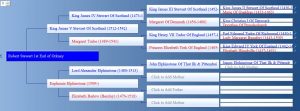I recently have been getting involved on the DNA side of genealogy. It is a science, so there’s a lot to learn. Fortunately, I have always liked science. I am new to this, so I have barely scratched the surface of what there is to know.
So far, I have found about 20 “cousins” and how we connect in our family trees. That’s always exciting! They have ranged from 2nd Cousin 1x Removed to 8th Cousin 1x Removed. One of my new connections is actually a branch of the family that my mother’s family lost touch with some 55 years ago! The older members of our family who remember each other are still alive, and are happy to be back in touch.
 The other exciting thing about DNA is that it can confirm your paper research. Finding matches with these other cousins has enabled me to confirm many of the lines I have been researching for years. The red parts of the fan chart below are ones that I have found DNA matches for. In case you’re wondering, most of the unproven lines are Irish. Either my relatives haven’t tested, or there aren’t many left to test. For instance, I know that my Sutton family largely died out several generations ago, so any remaining Suttons will be quite distant from me.
The other exciting thing about DNA is that it can confirm your paper research. Finding matches with these other cousins has enabled me to confirm many of the lines I have been researching for years. The red parts of the fan chart below are ones that I have found DNA matches for. In case you’re wondering, most of the unproven lines are Irish. Either my relatives haven’t tested, or there aren’t many left to test. For instance, I know that my Sutton family largely died out several generations ago, so any remaining Suttons will be quite distant from me.
I was hoping to solve a mystery 185 years in the making. In 1839, the Bergin family emigrated from Ireland to Australia, but left their 7-year-old daughter Johanna behind. I have a Johanna Bergin that would have been the right age, from the right area in Ireland. Research suggests strongly that she is the left behind girl. I have been working with an Australian descendant of her brother, and we had hoped that DNA might prove the tale. However, he and I didn’t match—which doesn’t prove anything, because we are just on the line where as cousins we might not share DNA even if we are related. I am trying to have him move his DNA to another website where my mother’s is, in hopes that a closer generational distance will unearth some DNA connection.
Many people do DNA testing for the fun of finding out their ethnicity. It can be fun to see, but keep in mind that the ethnicity estimates are just that—estimates. They will vary from company to company, as the algorithms are different, although they will be mostly similar. I got a good laugh over 2 tests showing me having <1% Oceania/Melanesia ethnicity when my parents don’t show any DNA from there.
There is a danger in DNA testing, though. In forums online, an amazing number of people who test have found they are not who they thought they were. Many find out that their father wasn’t their father, or their full sibling is only half. It can also shake out family secrets from farther back, when you don’t match anyone from, say, a grandparent’s line, but do match a whole bunch of names that aren’t on your tree. While the ethnicity is only an estimate, the actual DNA doesn’t lie.
I am enjoying exploring my DNA, and expanding the family as I do so. Hopefully, it will help me break down some “brick wall” ancestors at some point—although it hasn’t yet. I look forward to learning more about this science and my family!

Kerry,
It is so cool that you are having a sort of “intellectual challenge” pursuit of your genetic heritage. I have toyed with the idea of DNA but have done so little genealogical work of my own. I fear that the DNA results will be more puzzling than anything else. Having said that, it does still nag at me. My heritage is very different from yours – rather than having records that go back hundreds of years, my grandparents mainly came from that whole messy Russian Jewish mass migration in the early 2000s – so many of us were scattered thanks to invented names at Ellis Island, a willful disgust and forgetting of the past, no contact with relatives in the old country, and few if any records remaining back there. So there are many historic and ethnic differences in how much each of us can access the past in this way. If you’re interested in a complex story (a memoir) of a woman trying to figure out her multiple generations of midwestern ancestors, consider reading Songs of the Plains by Linda Joy Myers.
Jerry Waxler, author of Memoir Revolution
Jerry – DNA can be a boon for people with history like yours. DNA will cut through name changes, and connect those related. DNA testing is relatively rare in certain parts of Europe, but it is becoming more accepted. So while DNA might not be able to help you jump across the pond immediately, it may connect you with long-lost family here in the USA.
Irish genealogy is also victim of devastating record loss, making it very hard for those of us with Irish to go back much beyond the 1880s. I’m stymied on several Irish lines.
Kerry